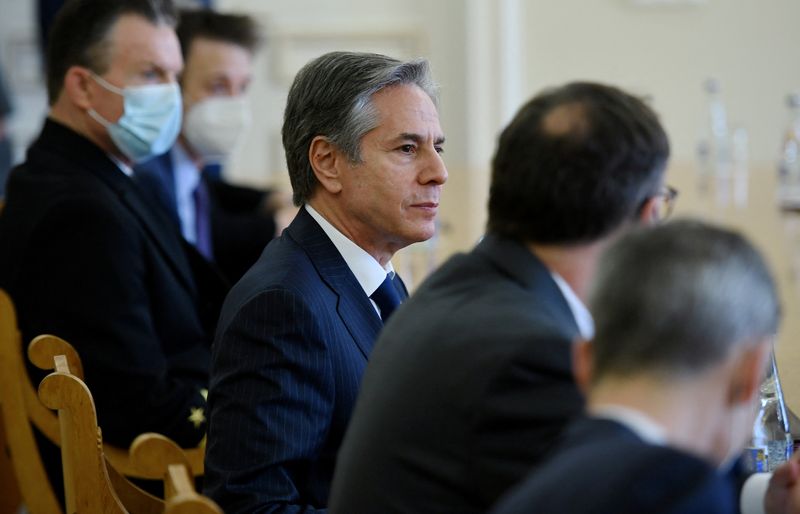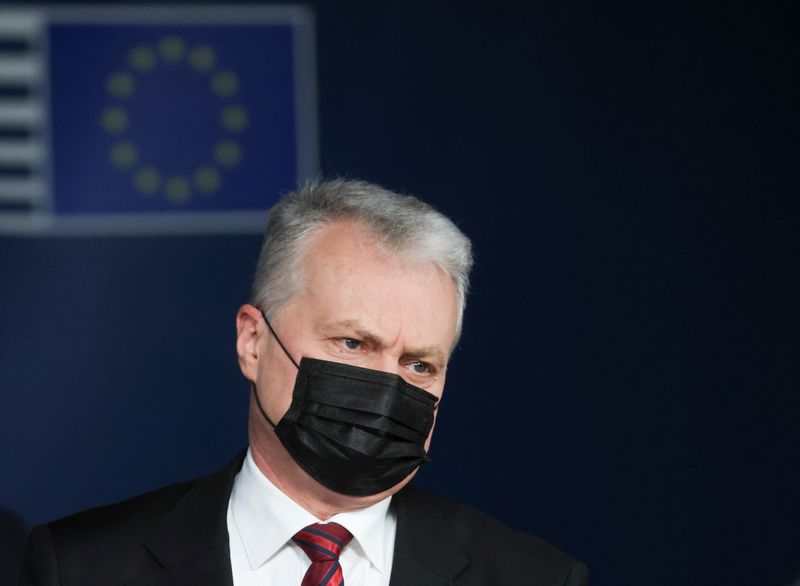By Simon Lewis and Andrius Sytas
RIGA/VILNIUS (Reuters) - U.S. Secretary of State Antony Blinken sought on Monday to reassure Washington's Baltic allies who fear President Vladimir Putin will not stop at Ukraine in trying to redraw the borders of Europe.
Blinken spent the weekend in Ukraine's neighbours Poland and Moldova before visiting Lithuania, Latvia and Estonia, NATO members that were once ruled from Moscow and fear they could face Russian aggression next.
Addressing Blinken, Lithuanian President Gitanas Nauseda warned that "Russia's reckless aggression" could lead to a "third world war".
"Deterrence is no longer enough and we need forward defence here in place because otherwise it will be too late here, Mr Secretary. Putin will not stop in Ukraine if he will not be stopped," Nauseda said.
Russia calls the campaign it launched on Feb. 24 a "special operation" that it says is not designed to occupy territory but to destroy its neighbour's military capabilities and capture what it regards as dangerous nationalists.
Blinken later met Latvia's Foreign Minister Edgars Rinkevics in Riga on Monday as well as the prime minister and president. Rinkevics called for a permanent presence of U.S. troops in the Baltic country.
"We have no illusions about Putin's Russia anymore, we don't really see any good reason to assume Russia might change its policy," Rinkevics told a joint news conference with Blinken.
Blinken said in Vilnius NATO was continuously reviewing its defence posture, including by looking at more permanent deployments, as Baltic countries have requested.
"No one should doubt our readiness, no one should doubt our resolve," he said.
The U.S. commitment to NATO's Article 5 guarantee of mutual defence between member states was "sacrosanct", Blinken added.
BATTLE DRONES
NATO countries have ramped up their presence in the Baltic nations and more troops and equipment are on the way, policy makers have announced. Some 400 U.S. troops from the First Armored Brigade Combat Team would be arriving in Lithuania in the coming days, Blinken said.
The Lithuanian government later announced an agreement to ramp up military spending this year, with additional funds to be spent on Javelin anti-tank weapons, battle drones, optical sights and other gear as well as upgrades to its military bases.
Lithuania also joined Ukrainian President Volodymyr Zelenskiy in calling for an embargo on Russian energy. Blinken said on Sunday the United States and European allies were exploring banning imports of Russian oil.
"Energy sources which we import pay for the Russian military operation. We cannot pay for oil and gas with the blood of Ukraine," Foreign Minister Gabrielius Landsbergis told a joint news conference with Blinken.
Russian gas cannot be easily replaced, however. Norway, Europe's second largest supplier, is already operating at maximum capacity, and Europe's existing LNG terminals have limited available capacity to absorb extra supply.

Blinken earlier told staff of the U.S. Embassy in Vilnius that Russia's invasion of Ukraine challenged basic principles designed to keep the peace between nations.
"It's important that people understand what's actually at stake and it goes beyond even Ukraine, beyond even the Baltic countries, beyond even Europe," Blinken said.
